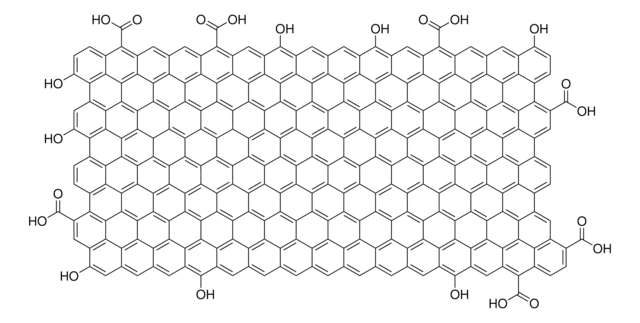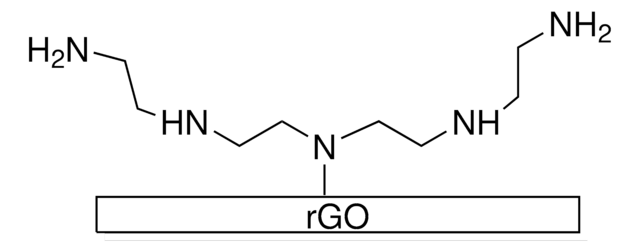777676
Graphene oxide dispersion
4 mg/mL,dispersion in H2O, avg. no. of layers, 1
Synonym(s):
GO dispersion in H2O
About This Item
Recommended Products
Product Name
Graphene oxide, 4 mg/mL, dispersion in H2O, avg. no. of layers, 1
description
dispersibility: Polar solvents
Quality Level
form
dispersion in H2O
feature
avg. no. of layers 1 measured in 0.5mg/mL (>95%)
avg. no. of layers 1
greener alternative product characteristics
Design for Energy Efficiency
Learn more about the Principles of Green Chemistry.
sustainability
Greener Alternative Product
concentration
4 mg/mL
greener alternative category
, Enabling
SMILES string
O=C(O)C1C2=C3C4=C5C6=C7C8=C9C%10=C%11C(C%12=C%13C%10=C%14C8=C%15C6=C%16C4=C%17C2=CC(C(O)=O)C%18=C%17C%19=C%16C%20=C%15C%21=C%14C%22=C%13C(C%23=C%24C%22=C%25C%21=C%26C%20=C%27C%19=C%28C%18=CC(C(O)=O)C%29=C%28C%30=C%27C%31=C%26C%32=C%25C%33=C%24C(C%34=C%35C
InChI
1S/C140H42O20/c141-131(142)26-13-23-15-44-62(140(159)160)45-16-24-14-40-31(132(143)144)5-1-29-41-20-48(135(149)150)56-33-7-3-28-27-2-6-32-55-37(133(145)146)11-9-35-60(138(155)156)42-17-25-18-43-61(139(157)158)36-10-12-38(134(147)148)58-46-21-50(137(153)154)59-47-22-49(136(151)152)57-34-8-4-30-39(19-26)51(23)78-72(44)88-75(45)80-52(24)79(54(29)40)95-71(41)83(56)101-93-69(33)64(28)91-90-63(27)68(32)92-86(66(35)55)73(42)81-53(25)82-74(43)87(67(36)58)96-76(46)85(59)103-97-77(47)84(57)102-94-70(34)65(30)89(78)105-104(88)115-98(80)111(95)116(101)126-122-110(93)107(91)120-119-106(90)108(92)99(81)114-100(82)112(96)118(103)128(124(114)119)123-113(97)117(102)127(130(122)129(120)123)121(109(94)105)125(115)126/h2,5,7-10,12-22,26,38,48-50H,1,3-4,6,11H2,(H,141,142)(H,143,144)(H,145,146)(H,147,148)(H,149,150)(H,151,152)(H,153,154)(H,155,156)(H,157,158)(H,159,160)
InChI key
VTWITIAIMADGRM-UHFFFAOYSA-N
Looking for similar products? Visit Product Comparison Guide
Related Categories
General description
Application
Storage and Stability
Storage Class Code
12 - Non Combustible Liquids
WGK
WGK 1
Flash Point(F)
Not applicable
Flash Point(C)
Not applicable
Choose from one of the most recent versions:
Already Own This Product?
Find documentation for the products that you have recently purchased in the Document Library.
Customers Also Viewed
Articles
Graphene oxide, a monomolecular layer of graphite with oxygen functionalities, holds unique properties valuable for various applications in materials science.
Graphene oxide, a monomolecular layer of graphite with oxygen functionalities, holds unique properties valuable for various applications in materials science.
Graphene oxide, a monomolecular layer of graphite with oxygen functionalities, holds unique properties valuable for various applications in materials science.
Graphene oxide, a monomolecular layer of graphite with oxygen functionalities, holds unique properties valuable for various applications in materials science.
Related Content
Batteries, fuel cells, and supercapacitors rely on electrochemical energy production. Understand their operation and electron/ion transport separation.
Batteries, fuel cells, and supercapacitors rely on electrochemical energy production. Understand their operation and electron/ion transport separation.
Batteries, fuel cells, and supercapacitors rely on electrochemical energy production. Understand their operation and electron/ion transport separation.
Batteries, fuel cells, and supercapacitors rely on electrochemical energy production. Understand their operation and electron/ion transport separation.
Our team of scientists has experience in all areas of research including Life Science, Material Science, Chemical Synthesis, Chromatography, Analytical and many others.
Contact Technical Service






